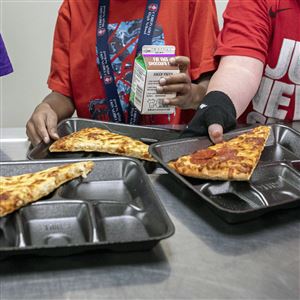As Hunger Action Month comes to a close, the state is awarding $1.6 million to community organizations pushing their infrastructure to the limit to fight the growing food insecurity crisis.
Forty food banks, pantries, shelters and soup kitchens across Pennsylvania have received Emergency Food Assistance Program Reach and Resiliency Grants. This money will help keep local food distributions up and running by funding things such as expanded cold storage, delivery vehicles and warehouse space and equipment.
"No one should go hungry in a state with the wealth and bounty we have in Pennsylvania," Agriculture Secretary Russell Redding said in a news release. "But far too often families do not know where their next meal is coming from and they need our help.”
According to Feeding America’s Map the Meal Gap, more than 1.1 million Pennsylvania residents – 8.9% of the state’s population and 13% of its children – may not know the source of their next meal.
With more families going hungry, Sandra Curry of the Community Partnership, a Butler County community action agency that received a $33,000 grant, said the demand continues to outpace the resources of local pantries. The Community Partnership took over the Butler County Food Bank just over a year ago, in July 2022, on top of providing food to over two dozen other pantries.
In March, the county’s food bank fed about 3,500 people, she said. That number has since jumped to more than 10,000.
“I didn't even expect those numbers were going to go up as much as they have,” Ms. Curry said.
That’s because, Ms. Curry said, people are feeling the loss of a multitude of pandemic-era benefits that phased out this year, including second monthly SNAP allotments that ended in February.
“I think folks who never had to use our services before are now finding themselves in a tough situation,” Ms. Curry said. “I know just for myself, my electric bill doubled in the last couple of months, my gas bill has gone up. I'm not the only one across Western Pennsylvania who has had that happen.”
In a region also grappling with aging infrastructure, Ms. Curry said the agency jumped to apply for a grant to cover one overdue update to their facility – their freezer that hadn’t been replaced since at least 2005 or 2006, Ms. Curry said. While the agency has a cooler, which is in need of repairs, the group has been forced to supply food for 33 pantries without frozen storage for several months. Storing food long enough for some pantries that open less frequently, some only once a month, proved difficult.
And all the while, the organization’s storage options for dry food, as well as perishable items, remain limited too as they outgrow their warehouse. The new freezer will open up much needed space, she said.
“Even our cooler is still very small,” she said. “We have to rent a Penske Truck and then the next day, get that product out to the pantries that we know are open and can take it because we just don't have the space for storage. It’s really going to help us be able to serve our pantry network. We’re really, really happy.”
Gov. Josh Shapiro committed to fighting food insecurity and hunger in Pennsylvania in the 2023-24 budget. This includes $46.5 million in funding to provide universal free breakfast to Pennsylvania’s 1.7 million public school students and free lunch to all 22,000 Pennsylvania students who are eligible for reduced-price lunches.
He also announced $2 million to fund the Fresh Food Financing Initiative to improve access to PA-produced foods and another $2 million increase to the State Food Purchase program.
Ms. Curry said the organization already carefully conserves its allotment from the food purchase program during the first half of the year, so it can place large food orders by the summer that will, hopefully, get their pantries through the rest of the year. It’s a strategy that helped keep the agency afloat during the recent budget impasse that put social services in a weeks-long holding pattern.
But these funds, which amounted to about $145,000 last year, must go to equipment and administrative upkeep too, not leaving enough for food directly, she said.
“If we have to get the cooler repaired, or we have to buy a new pallet jack or we have a forklift that needs to be repaired, that all has to come out of that allotment, so not all of it is directly spent on food,” she said.
Ms. Curry sees additional funding boosts like the TEFAP grant as a step in the right direction, but she says it will take more action from the state to keep Pennsylvanians from going hungry, she said.
“I don't think the entities that are looking at this can respond as quickly as the need is growing,” she said.
In Western Pennsylvania, Community Human Services in Allegheny County also received a grant. The organization received $50,000.
The state Department of Agriculture said it will be announcing a second round of the grants, with more than $2.5 million in available funding, next month.
First Published: September 26, 2023, 9:30 a.m.
Updated: September 26, 2023, 7:14 p.m.





















